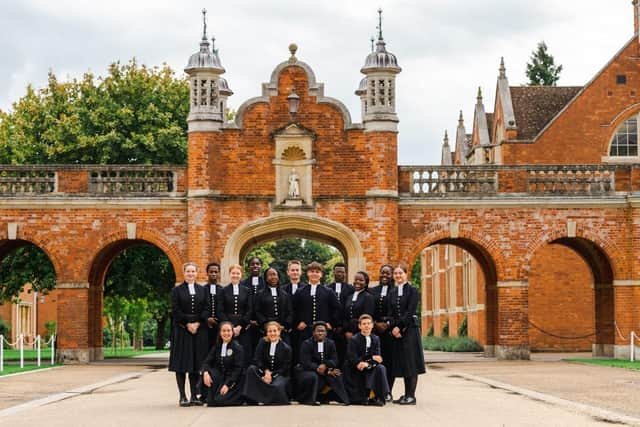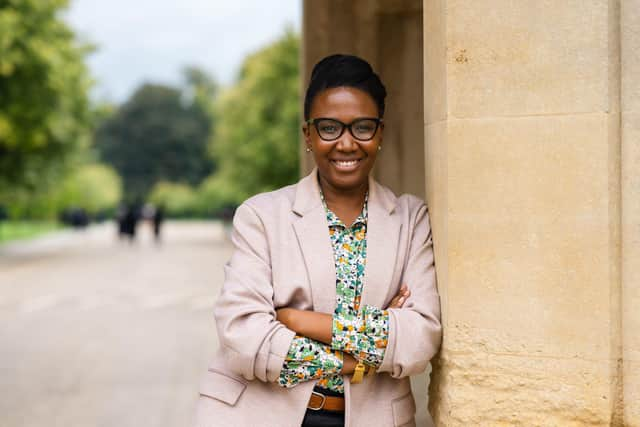Christ's Hospital appoints first ever equity, diversity and inclusion lead
and live on Freeview channel 276
Mutisunge Edwards is now working closely with staff in all departments, as well as with pupils, to help ensure that all aspects of the school’s work are viewed through the EDI lens.
The role was created following Christ’s Hospital’s partnership with an organisation called Inclusion Labs, last academic year. The aim of the partnership was to encourage open conversations about EDI issues between pupils, staff and parents. This led to the school taking forward a range of initiatives, including enhancements to their support of international pupils and of pupils with SEND, and ideas for ensuring that pupils of faiths other than Christianity feel that they belong.
Advertisement
Hide AdAdvertisement
Hide AdDeputy Head Ruth Brading said: "It is our aim for all pupils to know that they are valued for every aspect of their identity. There are numerous sources of support for pupils at CH, from house parents and tutors, matrons and nurses to the chaplaincy, safeguarding team and therapy service. Nonetheless, the workshops facilitated by Inclusion Labs helped us to understand that Christ’s Hospital needed a dedicated, knowledgeable EDI Lead, whom pupils can approach confidently to share ideas or concerns that are specifically related to EDI. We are delighted to welcome Mrs Edwards to Christ’s Hospital as our new EDI Lead.”


Interview with Mutisunge Edwards By the pupil members of the Christ’s Hospital African Caribbean Society
As EDI Lead, how will you promote inclusivity and diversity in a School rooted in tradition? How do you propose we move forward?
I’m hoping through you, the pupils. I think that the diversity of the pupils demonstrates that the School is willing to examine its traditions. CH has provided opportunities to you, to me, and many others like us. I’d like to believe that over the years the School has made changes that have made it more inclusive and I hope that continues. I believe it will, because they’ve hired me as the EDI Lead and I was encouraged by the interview process. Not for a minute did I feel like my appointment was a box ticking exercise. I’m here to implement change and that’s what I intend to do.
Advertisement
Hide AdAdvertisement
Hide AdWhat are your main goals at the school? What initiatives would you like to introduce?


I started out trying to understand the culture of Christ’s Hospital and I’m not so arrogant as to suggest that I have already figured out what needs fixing and how. But what I have seen is that staff are willing to implement new practices and hopefully, by introducing small but positive changes, we can have a positive influence. One idea is to learn how to pronounce names correctly, from the very first day a pupil arrives. If a teacher can greet you and say your name – not your preferred name or an abbreviation, but your full name – that makes a powerful statement. That is one way the school can become more inclusive and later, if you are comfortable and want to take on a nickname, that’s fine. That’s a choice you’ve made and not one that’s been inadvertently made for you. We have talked with the Admissions staff and hope that in future, names of pupils will be written phonetically as well. Everyone is willing to make changes if things may have been overlooked in the past in order to create a more inclusive environment.
What is your previous experience in EDI?
My background is predominantly in Early Years education. Throughout my career, I have tried to implement change and integrate inclusion from a young age. One idea was to have books featuring princesses with braids in their hair, with one version of the fairy tale Princess and the Pea featuring a Nigerian girl. She would go to different villages and say ‘hello’ in various dialects and that was her way of being a princess. Something as simple as that can carry a very powerful message when it is read by an African child. When I was in Nairobi, I remember a Kenyan girl being amazed, as she had never seen a princess who looked like she did. EDI has always been part of what I have taught, but this is the first time I have focused solely on EDI and it’s quite scary! I feel the weight of expectation and hope I can do justice to the role. I hope I can transfer my experience of working with and teaching younger children to teenagers here at CH, using different texts and source material to the children’s books I have used before, but essentially having similar discussions through questioning what we see and read.
What drew you into applying for the job and how have you been welcomed into the CH community?
Advertisement
Hide AdAdvertisement
Hide AdI was apprehensive about applying for the job, but then I came along for the Open Day and met members of staff. We spent an hour and a half in the CH Theatre talking about everything and at that point I felt I could fit into the CH community. Although none of the people I spoke to were Black, or even a woman, we still had a lot in common in aspects of our identity. It made me realise there is a lot of diversity here in terms of people’s backgrounds too.
How have I been welcomed? Well, the pupils are amazing! At the Open Day, I was shown around and was taken aback by how well-informed and challenged the pupils are here and that helped change my mind about working at CH. I hope I can assist pupils and staff in any way possible and will keep pushing the EDI agenda to influence positive change.
Have you ever been discriminated against for any reason? How did you deal with it?
Yes, due to different aspects of my identity: being a woman, a Black woman, an African Black woman. The thing I go back to is the pride that was instilled in me by my parents, to be happy with who I am and not to worry about what others see. In terms of working with the school community, I hope I can encourage pupils to be happy with who they are and to challenge any discrimination that comes their way.